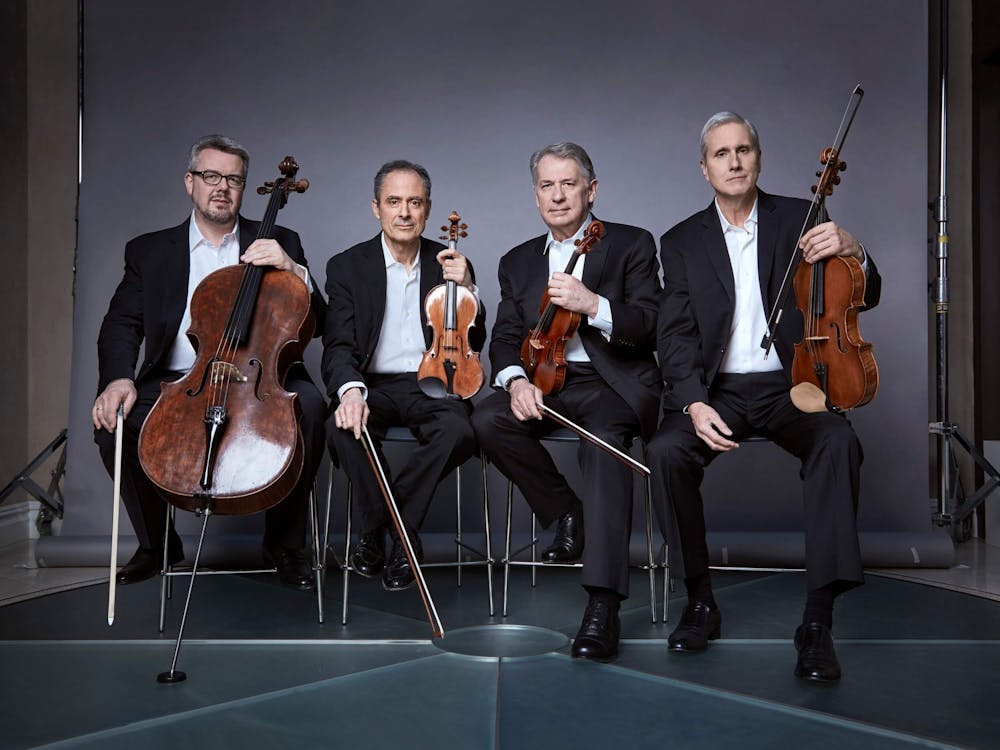Ralph Emerson famously remarked, “Music takes us out of the actual and whispers to us dim secrets that startles out wonder as to who we are, and for what, whence, and whereto.” When the Emerson Quartet – named in Emerson’s honor – played the first notes of their first song last Friday, the audience fell silent out of respect to the group’s nineteenth and final performance at Duke and awe at the wondrous opening. As the performance continued, it became apparent that the Emerson Quartet didn’t just borrow Emerson’s name: they borrowed his quote and, with it, their purpose.
After forty-seven years of performing, that purpose is now complete, and the Emerson Quartet has decided to dissolve after their final performance of the 2022-2023 concert season to focus on other things. First formed in 1976 while its original members were studying at Juilliard, the Emerson Quartet has gone on to become what is widely considered one of the leading string quartets of their time. In the process, they have won nine Grammys, three Gramophone Awards and the Avery Fisher Prize (awarded to American instrumentalists for outstanding achievement in classical music), have been dubbed Musical America’s “Ensemble of the Year” and have released over 30 albums.
Throughout their career, they’ve performed both stalwarts of the genre and pieces by new composers – allowing them to preserve chamber music history while also helping the form stay alive and vibrant – and have partnered with notable soloists like Renée Fleming. Duke University was a frequent site for the quartet, which performed a total of 19 times at Duke between 1983 and 2023.
For their performance, the Emerson Quartet played three renowned pieces of chamber music: Mendelssohn’s String Quartet No. 2 in A Minor, op. 13, Shostakovich’s String Quartet No. 12 in D-flat Major, op. 133 and Beethoven’s String Quartet No. 14, op. 131, C# Sharp. Mendelssohn’s String Quartet No. 2 in A Minor, op. 13 is a deeply passionate piece written by the then 18-year-old composer, inspired by "Ist es wahr? (Is it true?)", a short love song exploring themes of devotion and commitment.
The Emerson Quartet performed this piece masterfully and in a way that could only be described as flowing. Like a river, the Quartet played in absolute sync, even with Mendelssohn’s style of frequent and difficult runs, communicating the message of the song all the while. Shostakovich’s String Quartet No. 12 in D-flat Major is a bittersweet piece, written when the composer was plagued with illness and coming to the end of his life, making it well suited for the Emerson Quartet’s farewell. While mournful, it is also quite grand – being compared to a symphony by Shostakovich – and was the first piece where Shostakovich used an atonal 12-tone harmony, creating a sense of nuanced modernity. With this piece, the quartet was once again outstanding, totally capturing the full range of emotions in the piece and reaching its unusually high registers with ease.
The Beethoven piece was a fitting followup to Shostakovich’s work, as it was the string quartet to which Shostakovich dedicated his piece and additionally inspired the opening piece. It was also Beethoven’s last quartet before his death in 1827 (making it well-suited for a final performance) and his own personal favorite, consisting of seven unconventional movements that flowed seamlessly into one another. The last movement is a furious dance that Emerson violinist Philip Setzer described as “galloping through hell” and “very much about Beethoven’s struggle on Earth,” and it provided a resounding and fitting end to the performance.
Overall, the Emerson Quartet’s final performance was perfect in every way. It was masterful but not scripted, passionate but not fervent and powerful but not overwhelming. Through it all, a bittersweet feeling was in the air, as everyone knew this was the final time these men would perform in this place.
Once the performance and the thunderous applause were over, the quartet came out and spoke about their bittersweet feelings about their final time at Duke. They then started an unexpected encore: the seven of Dvořák’s twelve Cypresses, a series of love songs arranged for a string quartet. But before they performed, one member spoke briefly on two different potential translations of the original Czech Title Kol domu se teď potácím: There once lived my sweetheart and I wander past yonder house. The former title seemed to be more suited to the fitting as that was the encore, a piece that felt at once longing and bittersweet. Yet, while it is sad to see them go, what matters more is that we got to witness their wonderful journey, which – to paraphrase Emerson – is what truly matters.
Get The Chronicle straight to your inbox
Signup for our weekly newsletter. Cancel at any time.
Zev van Zanten is a Trinity junior and recess editor of The Chronicle's 120th volume.

